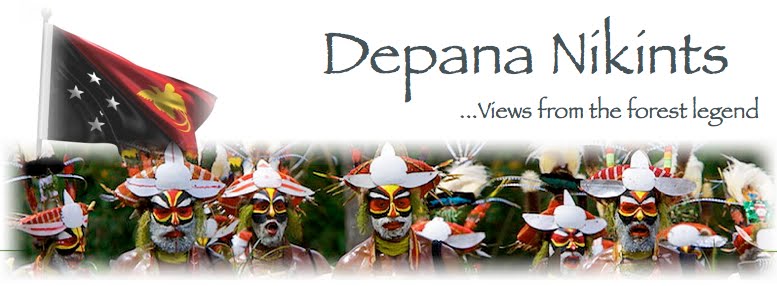(Reflecting on PNG 34th Independence Anniversary)
When the children of this land sang the National Anthem and lift the black gold and red flag on September 16, 2009, there was a sense of emptiness in the song. The lyrics sounded foreign as it does not reflect the spirit of the people of this country. Rundown education and medical facilities, high school fees, high cost of living, poor infrastructures, corruption and the list goes on.
Papua New Guinea’s National Constitution developed before the independence in 1975 was based on five key pillars set by the Constitutional Planning Committee quoted below:
“We hereby proclaim the following aims as our National Goals and Direct all persons and bodies, corporate and unincorporated, to be guided by these our declared directives in pursuing and achieving our aims:
Papua New Guinea’s National Constitution developed before the independence in 1975 was based on five key pillars set by the Constitutional Planning Committee quoted below:
“We hereby proclaim the following aims as our National Goals and Direct all persons and bodies, corporate and unincorporated, to be guided by these our declared directives in pursuing and achieving our aims:
1. Integral Human Development:
We declare our first goal to be for every person to be dynamically involved in the process of freeing himself or herself from every form of domination or oppression so that each man and women will have the opportunity to develop as a whole person in relationship with others.
2. Equality and Participation:
We declare our second goal to be for all citizens to have an equal opportunity to participate in and benefit from the development from our country.
3. National Sovereignty and Self Reliance:
We declare our third goal to be for Papua New Guineans to be politically and economically independent, and our economy basically self reliant.
4. Natural Resources and Environment:
We declare our fourth goal to be for Papua New Guinea’s natural resources and environment to be conserved and used for the collective benefit of us all, and be replenished for the benefit of our future generations.
5. Papua New Guinea Ways:
We declare our fifth goal to be to achieve development primarily through the use of Papua New Guinea forms of social, political and economic organisation.”
The PNG Constitutional Planning Committee in 1975 also had a vision for PNG quoted below:
“We see the darkness of the neon lights. We see the despair and loneliness in the urban cities. We see the alienation of people that is the result of the machine oriented economy. We see the true social security and the people’s happiness being diminished in the name of economic progress. We caution therefore that large scale industries should be pursued only after very careful and thorough consideration of the likely consequences upon the social and spiritual fabric of our people. There is overwhelming evidence to suggest that a significant number of people who live by the fruits of multi-million dollar multi-national corporations live in misery, loneliness and spiritual poverty. We believe that since we are a rural based people, our strength should be essentially in the land and the use of our innate artistic talents” (PNG Constitution Planning Committee 1975)
The Constitution Planning Committee set the development path for PNG and its people in 1975 through the national goals and directives and its vision.
Quoted below are 3 of the quotes of 3 famous PNG and Melanesian Leaders:
“All of us in Bougainville, PNG and Melanesia; and everybody in the Pacific need our land. Our lives depend on our land and our resources which are our wealth. What do we (160,000 Bougainvilleans) need the biggest copper mine in the world for?”
Francis Ona
“Do we really want to become a country of big cities? In all the 700 languages of our country we have never needed words for air pollution, for slum or for unemployment. Do we wish to build the kind of country that needs these words?”
Michael T Somare (1973)
“The concept of land ownership goes beyond human existence, for while a person is a transient creature, land is permanent, irredeemable and non-disposable. Land is the link between the earth and the sky, the sea and the clouds, the past and the future. Because land is eternal, it is owned in a sacred trust for the succeeding generations.”
Bernard Narokobi
Reflecting on the 34th Independence Anniversary of this beautiful country (PNG), it is very clear the country has gone off the tangent. The leadership that had the bright and sharp eyes during the preparation stages of independence in the early 1970’s have gone blind and lost vision. In a very short period of a little of 30 years, the country has been ripped off big time by multinational corporations and few corrupt elites of this country. The future of this country looks bleak.



No comments:
Post a Comment